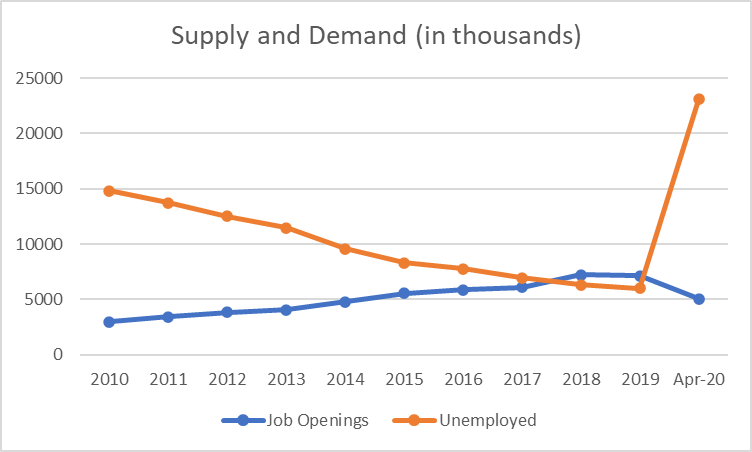Power in the employment relationship is an interesting concept and I have never actually discussed the matter using that term. We typically talk about the employment relationship in terms of who has control, but it is easy enough to translate control into the word power. For nearly a decade following the 2008 recession, unemployment was declining and with that decline employees took control (or power) in the employment relationship. Voluntary turnover went up as unemployment declined and job creation increased.
Suddenly, with the pandemic that picture changed. We talk about this in terms of supply and demand. In the blink of an eye, over 20 million workers were unemployed and job openings began a sharp decline. The supply and demand tipping point we saw in 2018 was suddenly reversed.

What is the Employment Relationship and Why Does it Matter?
A couple of weeks ago I was asked to conduct an interview for an article to be published in Ladders on how the COVID19 pandemic may have shifted power in the job market. Jennifer Fabiano did a very nice job on the article and it is worth the read and you can find it here. However, there was a point that I made to Jennifer that did not make it into the article that I felt was worth expounding.
I made the point in the article that “choice” is what fuels power (or control) in the workforce. When jobs were plentiful, and unemployment was low, employees had the power of choice. The point that I felt Jennifer missed in her article is that employers believe that power (or control) in the employment relationship comes from money. That employees leave companies by choice to make more money hence making compensation the linchpin, but that could not be further from the truth.
What is Important to Employees in the Employment Relationship?
Our research shows time and time again that less than 10% of employees who leave voluntarily cite money as the root cause. Issues like career development, work-life balance, or manager behavior are much more likely to be the root cause – not money.
This takes us back to this shift in power. Today, employers find themselves back in the power position – back in control. There are fewer jobs available and most employers, other than those select industries that have been positively impacted by the pandemic (grocery chains, home improvement, online shopping, etc.), are not hiring at the same rapid pace.
My caution for employers is this: Be careful. With power comes great responsibility and employees have long memories.
Why the Employment Relationship Matters
How employers treat employees during this time will have significant impact on employee engagement and retention for months and years to come. And if history tells us anything, the power will shift again, and it could be suddenly if the economy roars back to life.
Employers that choose to not create the conditions that employees desire related to career development, work-life balance, and how managers treat employees will see poor productivity and voluntary turnover skyrocket when the power shift occurs again.
So right now is when employers should double-down on their efforts to create an environment where employees CHOOSE to stay once the power shifts.
Build a Solid Employment Relationship at Your Company
Listen to employees through surveys and one-on-one conversations to understand where the organization falls short of meeting employee’s expectations.
Those are the companies that will ultimately win the battle in the next war for talent. If you would like help developing a good employment relationship and building out a well organized plan for employee engagement, you can contact our workforce experts today for a consultation.


